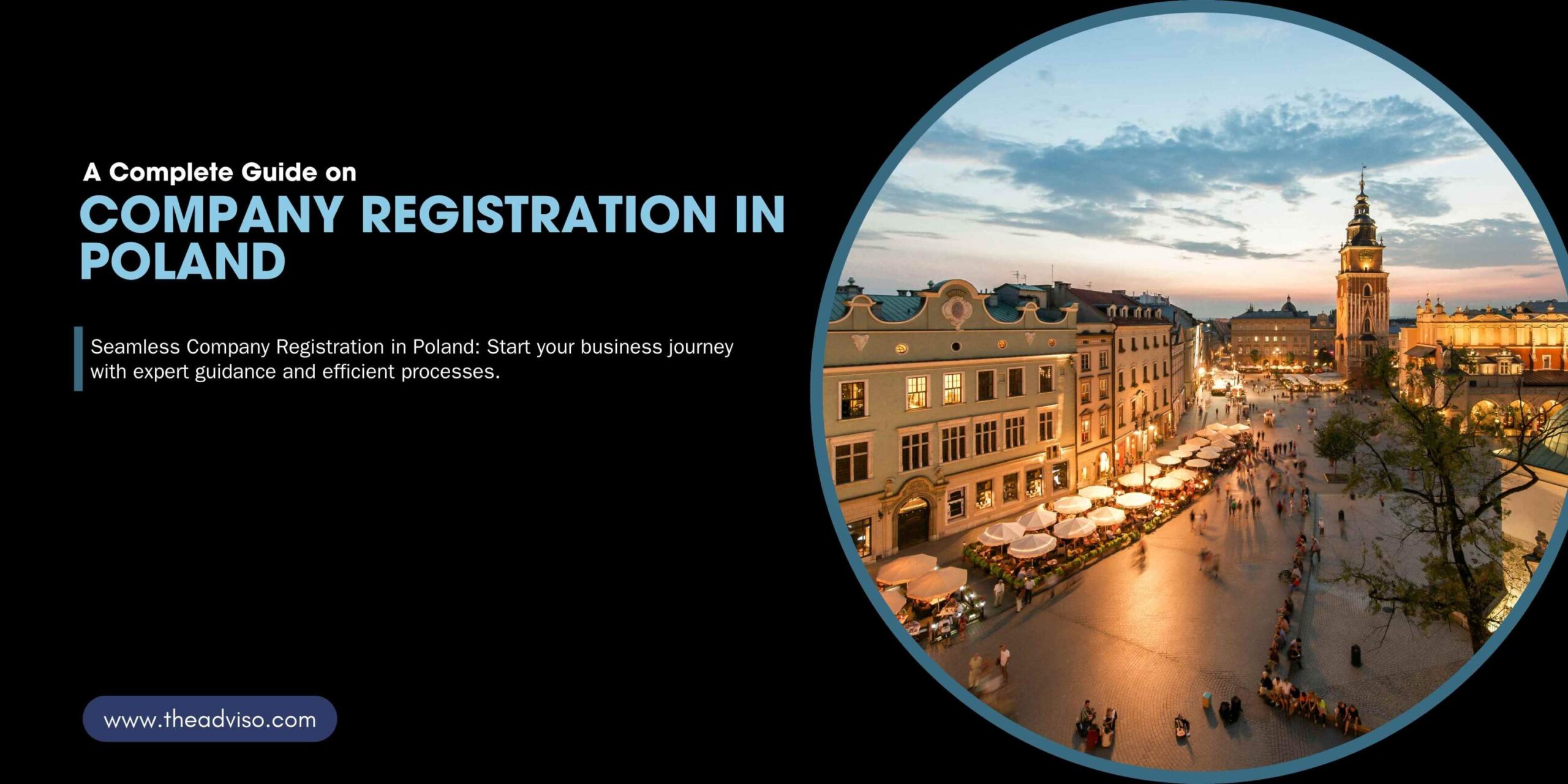Company Registration in Poland
Any company seeking to reinforce its presence in Poland must ascertain general norms to avert legal hindrances. This guide will shed light on the legalities concerning company registration in Poland, giving you comprehensive details of what is required for a successful business launch. So, let’s get started without any further ado.
What makes Poland an Ideal Business Hub?
Poland’s undisputed business potential stems from its robust economy, cheap labor, and massive consumer markets. Overseas companies seeking diversification can plunge into the Polish market for sustainable and long-lasting growth. The stats below give a clear idea about this country’s potential in terms of business and economy:
- The nation has achieved a total revenue of US$5.41m in 2022 in the business market, showing growth potential for all business forms.
- By 2029, the country expects to clock a CAGR of almost 9.5% for total revenue, likely to acquire a projected market volume of US$11.84m.
- The country has registered In-app purchase (IAP) revenue of US$3.23m in 2022.
- The advertising revenue clocked around US$1.47m in 2022 with a total number of downloads reaching 12.65m.
- The service sector has emerged as the major contributor to the economy, ruling with 37% of the nation’s market size.
- Followed service sectors, industries from the real market, finance, manufacturing, etc are making waves with respectable growth.
Business Structures for the Company Registration in Poland
The country fosters various company structures, including:
- General Partnership
- LLP (limited liability partnership)
- CLP (civil law partnership)
- JSP (limited joint-stock partnership)
- SJSC (simple joint stock company).
- Limited Liability Company
- Joint Stock Company
Among these Joint stock companies and LLCs attract more businesses owing to their apparent benefits such as controlled liability, expansion potential, minimal compliances, etc.
Cost of Securing a Company Registration in Poland
The cost of company registration in Poland typically ranges from 2.000 – to 5.000 EUR, excluding the following expenses that contribute overall registration fee:
- VAT number
- EORI number
- PESEL numbers for Directors
- e-signatures for Directors
- Bank account opening
Notable Pointers Concerning Company Registration in
Poland
- An entity registered as a Polish company prevents shareholders from some unlimited liabilities
- 1,150 EUR (5,000 zł) is the minimum capital for constituting the LLC.
- 23,500 EUR (100,000 zł) is the minimum capital for constituting the JSC.
- There is no cap on the shareholders’ or directors’ nationality.
- Directors or shareholders can belong to any residency status.
- The formation of a company boasting one shareholder is permissible.
- The Corporate Income Tax Rate (CIT) has been capped at 9% for entities reaping annual turnover of less than 2,000,000 EUR. Entities surpassing such a threshold must pay CIT @ 19%.
- Investors have access to various tax exemptions and discounts
- Bookkeeping is a mandatory affair for entities as per the Polish accounting rules and so does the audit, except for a limited liability company if the turnover limit is not crossed.
Steps to Secure Company Registration in Poland
Step 1 – Keep the basics intact
If you are registering a Foreign subsidiary in Poland, make sure you abide by the given norms:
- Keep the minimum share capital and share value above 5,000 zł and 50 zł, respectively.
- Select at least one board member
- Define who would have the signatory power
- If you seek shares with preferred rights, mention the same in AoA
- Refer to the special PKD codes before selecting core business objectives
- Pen down custom regulations in AoA concerning Put options or restrictions, sale trading procedures, pre-emptive rights and Call options
Step 2: – Arrange the Mandatory Dossiers
This step involves arranging key documentation such as:
- Good standing certificate or equivalent: The parent company must secure this document from the competent authority, reflecting key information such as name, address, and authorized signatories.
- ID proof of proposed directors such as DL, National ID, passport, etc.
- Notarial Power of Attorney (legalized by a notary) if the agent is involved with registration endeavors.
Post submitting to Polish authority in the local dialect, all these documents will then be translated into the local language by by Polish sworn translators.
Step 3 – Company Incorporation in Poland!
The company registration in Poland technically starts with the execution of AoA, the appointment of directors, and the depositing of initial share capital. There are two ways to complete this process.
The first is the online registration process. Visit the S24 web-based portal available to entities or persons with a PESEL number and Trusted Profile.
The second way is the traditional process wherein a notary will legalize the articles of association. This process offers no constraints to anyone seeking company registration in Poland, ensuring widespread access to almost everyone. Coming to the directors’ appointment, the company can pass a simple resolution or appointment statement based on the AoA’s norms.
As far as share capital submission is concerned, it can be done by submitting the amount to the shareholder’s account or deposit account registration provider. The director’s account or foreign provisional account can be used for this purpose.
Step 4 – Visit National Court Register
Depending on how AoA has been executed, the process of submitting application to the KRS – Polish Business Register differs accordingly. These include:
S24 system: The online registered company must submit their application via the S24 system.
PRS system: companies registered via a traditional mode must focus on the PRS system.
The application process is a delicate procedure, heavily prone to human errors, which can often lead to application rejection. Thus, it is advised to team up company like Adviso to stay atop such nuisances.
Step 5 – Adhere to Post-registration compliance
Adherence to the given compliances is mandatory for every entity operating in Poland:
| Action | Time Frame | Details |
| Ultimate Beneficial Owner Reporting | 14 days | Every new Polish company must report its Ultimate Beneficial Owner (UBO) to the Central Beneficial Owners Register (CRBR). In Poland, a UBO is defined as any natural person who has control over a client through legal or factual means. |
| Transfer Tax Payment and Reporting | 14 days | Submit the relevant return (PPC-3) and pay a tax amount of 0.5% of the capital. Companies incorporated traditionally at the notary are exempted from this obligation, as the notary will withhold and remit the tax to the tax office. |
| Tax Office Reporting – NIP-8 Form | 21 days | New Polish companies must report basic information to the competent Tax Office using the NIP-8 form. This includes the company’s address, accountant details, and bank account information. |
| VAT Registration | N/A | VAT registration is optional but common. Most firms apply for VAT registration using the VAT-R form. The registration process requires proof of address (lease or ownership) and takes about 1-2 weeks. |
| EORI Registration | N/A | EORI registration is optional but commonly applied for by firms intending to export and import goods. Obtaining an EORI number typically takes about 1 week. |
Stage 6 – Open a bank account
The overseas entity registering in Poland does not require an account in a local bank. Instead, they can rely on their home bank account for corporate transactions. However, opting for such an account can prevent companies from accessing tax exemptions and discounts. Therefore, it is advisable to choose a Polish bank account.
Conclusion
Securing a company registration in Poland is not as complicated as seems thanks to a straightforward process, relaxed norms, and minimal paperwork. If you encountered any registration-related quandaries while reinforcing your presence in this country, feel free to connect with Adviso- Your trusted ally that specializes in international business, processes, and legalities.
Read Our Article: Company Registration in Luxembourg: A Guide For Indian Entrepreneurs




